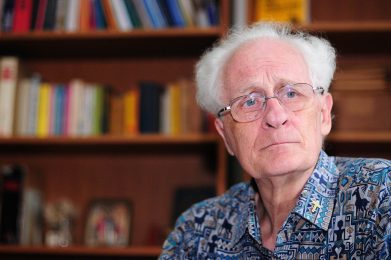Fr Magnis-Suseno: strength and trust from the Pope, so as not to turn inward
The Jesuit, a well-known member of the Indonesian Church, speaks about what Francis will say tomorrow in Jakarta to the authorities and the local Catholic community. The most important issues today are “friendship between religions and care for the environment.” This trip is different from the John Paul II's in 1989, when Suharto was still in power. For Fr Magnis-Suseno, “The danger today is called oligarchy,” but he has faith in the future.
Jakarta (AsiaNews) – Fr Franz Magnis-Suseno, 88, is one of the most authoritative voices in the Church and civil society in Jakarta. The Bavarian-born Jesuit has been an Indonesian citizen since 1977, and the soul of the Driyarkara School of Philosophy for decades, with his reflections on public ethics and commitment to dialogue between Christians and Muslims.
“We expect Pope Francis to give us an injection of strength and confidence,” he said about the papal visit. “I think that he will emphasise two themes above all in his speeches, friendship between religions and care for the environment, which is a fundamental issue here.”
He spoke to AsiaNews about the atmosphere in Jakarta where the pontiff will deliver his first official speech tomorrow at the Presidential Palace, before the country's authorities, the diplomatic corps, and representatives of civil society, which will be followed by an address in the cathedral, during the afternoon meeting with bishops, priests, religious men and women, and pastoral workers.
"For Catholics," Fr Magnis-Suseno said, "this visit is certainly a great help; it makes us aware that we are in the Pope's heart. But in recent days I have had the opportunity to see how much many Muslim groups are also waiting to hear him. The Nadhlatul Ulama and Muhammadiyah youth are all excited about his arrival.”
There is a lot of talk about the "tunnel of friendship", a 30-metre passageway that connects the cathedral to the Great Istiqlal mosque, which Francis will cross on Thursday morning. For the Jesuit clergyman, this symbol should help grasp the history of relations between Christians and Muslims in this country.
The starting point is the shared "faith in the one God" and the concrete commitment to unity in diversity that characterises the national doctrine of Pancasila (five principles) that Sukarno, the founding father of independent Indonesia, wanted as the basis of coexistence.
“Thanks to the doctrine of Pancasila, from the very beginning, the vast majority of Muslims did not insist on making Indonesia an Islamic state," the elderly priest explained.
"This has also ensured a constant improvement in relations between Christians, Catholics and Evangelicals, who together are about 9 per cent of the population, and Muslims. However, some distinctions must be made; even in Indonesia there is Islamic radicalism, which touches about 20 per cent of the Muslim community in different ways and degrees.
“But the mainstream, the majority group, has this positive attitude, this trust in relations. More than at us non-Muslims, the extremists look at groups like the Nadhlatul Ulama or the Muhammadiyah as their enemies to be ‘converted’.”
Tomorrow morning Pope Francis will speak to government authorities, at a time of delicate political transition. When John Paul II visited in 1989, Suharto's authoritarian regime still ruled.
Tomorrow Francis will be welcomed by outgoing President Joko Widodo, who led the country for two mandates. The latter has been strongly criticised for striking a deal with his former rival, Defence Minister Prabowo Subianto, who will succeed him in a few weeks, allowing him to get his son Gibran elected as vice president by bypassing the constitution.
“Today the political situation is completely different from that of 1989. We had what we call Reformasi that led to the end of Suharto's regime in 1998. Today, human rights and the democratic method are in the constitution,” Fr Magnis-Suseno explained.
“Yes, today we are experiencing a troubled situation again. Indonesian institutions are showing signs of weakness, but for completely different reasons. The danger today is called oligarchy. Political parties do not represent the people, and rulers risk serving only financial interests.”
"However, these are not problems related to religion. On the future of coexistence in this country, I remain optimistic,” the Jesuit insisted. “When Suharto came to power, some Christians, especially Catholics, understood that it was good to bet on Muslims, that it was necessary to increase trust in relations.
“Many figures and friends in the Islamic community did the same, like Abdurrahman Wahid, who later became the fourth president of the country. Together we have managed to create peace and progress, openness to democracy. The important thing today, even for us Christians, is to continue to open up, not to turn inward.”
27/06/2016 18:12







.png)










